- Home
- Hanif Kureishi
Gabriel's Gift
Gabriel's Gift Read online
Gabriel’s Gift
HANIF KUREISHI
For Kier
Contents
Title Page
Dedication
Chapter One
Chapter Two
Chapter Three
Chapter Four
Chapter Five
Chapter Six
Chapter Seven
Chapter Eight
Chapter Nine
Chapter Ten
Chapter Eleven
Chapter Twelve
Chapter Thirteen
Chapter Fourteen
Chapter Fifteen
Chapter Sixteen
Chapter Seventeen
About the Author
By the Same Author
Copyright
Chapter One
‘School – how was, today?’
‘Learning makes me feel ignorant,’ said Gabriel. ‘Has Dad rung?’
As well as the fact he didn’t know where his father was, something strange was happening to the weather in Gabriel’s neighbourhood. That morning, when he left for school with Hannah, there was a light spring shower, and it was autumn.
By the time they had reached the school gates, a layer of snow sat on their hats. At lunch-time in the playground, the hot floodlight of the sun – suddenly illuminated like a lamp – had been so bright the kids played in shirtsleeves.
In the late afternoon, when he and Hannah were hurrying home along the edge of the park, Gabriel became certain that the leaves in the park were being plucked from the ground and fluttered back to the trees from which they had fallen, before turning green again.
From the corner of his eye, Gabriel noticed something even odder.
A row of daffodils were lifting their heads and dropping them like bowing ballerinas at the end of a performance. When one of them winked, Gabriel looked around before gripping Hannah’s hairy hand, something he had always been reluctant to do, particularly if a friend might see him. But today was different: the world was losing its mind.
‘Has he been in touch?’ Gabriel asked.
Hannah was the foreign au pair.
‘Who?’ she said.
‘My father.’
‘Certainly no. Gone away! Gone!’
Gabriel’s father had left home, at Mum’s instigation, three months ago. Unusually, it had been several days since he had phoned, and at least two weeks since Gabriel had seen him.
Gabriel determined that as soon as they got back he would make a drawing of the winking daffodil, to remind him to tell his father about it. Dad loved to sing, or recite poetry. ‘Fair daffodils, we weep to see / You haste away so soon …’ he would chant as they walked.
For Dad the shops, pavements and people were alive like nature, though with more human interest, and as ever-changing as trees, water or the sky.
In contrast, Hannah looked straight ahead, as if she were walking in a cupboard. She understood little English and when Gabriel spoke to her she grimaced and frowned like someone trying to swallow an ashtray. Perhaps they were both amazed that a kid spoke better English than she did.
Although Gabriel was fifteen, until recently his father had usually walked him home from school in order to keep him away from any possible temptations and diversions. Not long ago Dad had had to rescue Gabriel from a dangerous scene in a nearby block of flats. Fortunately Dad was a musician and often had spare time during the day; too much spare time, said Gabriel’s mother, who had started to find Rex himself somewhat ‘spare’. Going to the school had been the only ‘structure’ Dad had, apart from his daily visits to the pub, where several of the other parents also considered the world through the bottom of a beer glass.
Gabriel and his father often stopped at cafés and record shops. Or they went to collect the photographs Gabriel had taken recently, which were developed by a friend of Dad’s who had a dark-room. In the sixties and seventies this man had been a successful fashion and pop photographer. The girls with ironed hair and boys in military jackets he had ‘immortalized’, as he liked to put it, were as distant to Gabriel as Dickens’s characters. The man was out of fashion himself and rarely worked; however, he liked to talk about photography, and he lent Gabriel many books and tore pictures from newspapers, explaining what the photographer had tried to do.
Dad liked to say that school was the last place where anyone could get an education. But outside, if your eyes were open, there were teachers everywhere. All that Dad recalled from his own school-days was something about wattle and daub, freezing swimming pools at nine in the morning, and the rate of glacier movement, which was – well, he couldn’t remember.
Getting home was a protracted business for Gabriel and his father. Planting his legs wide on the pavement and swinging his hand for illustration, Dad would ask the most intimate questions of people he knew only vaguely – How much do you drink? Do you still go to bed together? Do you love her? – which, to Gabriel’s amazement, the person not only answered but elaborated on, often interminably, as Gabriel’s father nodded and listened. The two of them would discuss the results for the rest of the way home.
Now Dad had gone and was living somewhere else. If the world hadn’t quite been turned upside down, it was at an unusual and perilous angle, and certainly not still.
Since Dad’s departure, Gabriel’s mother insisted that Hannah pick Gabriel up. Mum didn’t want to worry about him more than she already did.
Today, as Gabriel and Hannah rushed on, there was a sound behind them: it was either a giant clapping in their ears, or thunder. Going up the front path, a cloud of fog and hail descended and they couldn’t see in front of them. Gabriel tripped on the step, but luckily Hannah was ahead of him. At least she guaranteed a soft landing.
When Gabriel returned from school these days, the house almost echoed. Neither of his noisy, quarrelsome parents came to the door. Normally he, Mum and Dad would have Earl Grey in a pot, crumpets soggy with butter – ‘I love a bit of crumpet in the afternoon,’ Dad would always say, a remark that could only have hastened his departure – and cakes; they loved anything involving cream and chocolate.
What had happened was this.
One evening, three months ago, Gabriel had looked out of the living-room window and seen his father packing his clothes and guitars into the back of a friend’s van. Dad returned to the house, kissed his son, and waved at him from the street.
Gabriel had run to the gate. ‘Where are you going?’
‘Away,’ said Dad. ‘For a time.’
‘On tour?’
‘I’m afraid not.’
‘On holiday?’
‘No. No …’
‘Where then?’
‘Gabriel –’
‘Is it my … er, bad behaviour, that has caused this?’
‘Could be … Oh, don’t be stupid.’
In a hurry to get away, and not wanting to talk, his father had stood there with his oldest guitar under one arm and a shaving bag, briefcase and trumpet under the other. For some reason he had a camera round his neck, as well as a bag out of which shirts were tumbling; his pockets were packed with underpants and socks; planted on his head were several woolly hats.
‘Go inside,’ he said. ‘Keep warm.’
‘When are you coming back?’
‘I will explain everything later,’ he said, as he always did when he intended to say nothing.
‘Don’t go.’ Gabriel took his hand. ‘Stay a bit longer. I won’t interrupt when you’re talking for a long time.’
His father had pulled away. ‘I’ve got to get out. It’s what your mother wants. Will you pick up those socks for me? You know I can’t bend over.’
Gabriel had stuffed the fallen socks into his father’s top pocket.
Dad climbed into the van.
As it started to draw away, Mum had raced from the house and flung at the van, with hysterical strength, a forgotten pair of Dad’s boots which the car behind ran over, crushing them. When the van stopped and Dad climbed down to pick up his useless flattened footwear, Gabriel wondered whether his father might return to the house.
‘My favourite part of that man is his back.’ Mum had said, slamming the door. ‘But what will happen now, I don’t know. You never stop eating and wanting!’
‘Me?’ he said. This was normally how she talked to Dad.
‘We haven’t got any money!’ she said.
‘We’ll have to earn some.’
‘What a good idea. When are you going to start work?’ She looked at him properly. ‘In lots of ways you’re still a little kid but actually you’re big enough. But I wouldn’t want you to put up with what I’ve been through.’
The rumble and whirr of his mother’s sewing machine had been the soundtrack to Gabriel’s childhood. She had started off, in a more glamorous time, by making party clothes for her young, fab friends in the music business, and then for the bands, their managers and groupies. Mum had done it as a favour and because she liked to please. Had she been a designer like her heroine Vivienne Westwood, she might have progressed.
As it was, for the last few years she had supported herself, Gabriel and Rex by working in a cramped room in the house, making tour jackets for groups, roadies and their helpers. Sometimes she had to work all night for weeks to have them ready, doing everything herself, with only opera on the radio for company.
A few years ago, when the country decided it should become entrepreneurial and began dizzily to bolt about like someone who’d just awoken from an overlong sleep, she had tried to expand the business by renting a small warehouse and employing the unemployed. But the work had been irregular and she had got into debt. Now, working alone again, the job was lonely. She was looking for something else; somehow her whole life had become a ‘looking for something else’.
Gabriel considered the ideas his parents used to enjoy discussing over supper. One of them was for a shop that sold only blue objects. Another was for a shop that sold pyjamas.
‘It isn’t difficult to see why we haven’t been able to afford a new carpet for years,’ Mum had said.
A better idea was for a shop where you could pop in to have your dreams interpreted and be told your future. Mum had said this wasn’t entirely vapid: if you saw the present or the past in a dream, you could predict the future, since for most people the present was merely the past with a later date. Gabriel wasn’t sure how lucrative this would be, even if dreams, like pyjamas, were something that everyone had to have.
‘At night even the most conservative of us becomes an avant gardist,’ his mother had said.
Gabriel had been very interested in this. ‘I want to be an avant gardist all the time.’ he said.
‘That’s why they have schools,’ said his father. ‘To stamp out that kind of thing.’
His parents had argued a lot, saying the same things repeatedly, louder each time. He remembered his father placing objects in inconvenient positions on the floor, in the hope that Mum would fall over and break her neck.
It was clear that she, in her turn, wanted Rex to wake up one day as a different sort of person, the type who earned money, didn’t mind cleaning, sometimes kissed her, and was less melancholic than her. A tall order, obviously.
Gabriel had never seen his mother more agitated than on the day his father left. She had gone into her room and shut the door. What could Gabriel do but sit outside trying to draw, waiting for her? It reminded him of standing on a chair at the window as a child, awaiting Mum’s return from the shops.
‘When I’m gone, you won’t know what to do without me,’ Dad used to say.
‘When you’re gone, Rex, we’ll know exactly what to do. Our souls will soar. You’re the ballast in our balloon, mate. We’ll be better off in every way,’ his mother replied.
Would they be?
He thought he heard his mother opening the window. Drawers were pulled out; the wardrobe door banged. For too long, there was silence. He wanted to call someone. But who? The police? A neighbour? Mum might stay in bed for days, perhaps for weeks. If she wasn’t arguing with Father, what would she do?
He had noticed, in his friends ‘parents too, that there were different styles of madness for men and women, fathers and mothers. The women became obsessive, excessively nervous, afraid and self-hating, fluttering and blinking with damaged inner electricity. The men blunted themselves with alcohol and cursed, blamed and hit out, disappearing into the pub and then into jail.
When it came to suffering, Gabriel’s mother was, at least here, something of an artist, with a range of both broad and subtle manoeuvres. She could enter an airless tunnel of silence that would wither Rex and Gabriel until they felt like dried sticks; or she could put together words and noises of a force that could fling them against a wall and leave them shaking for days. Whichever method she selected was guaranteed to ensure that her ‘common-law’ husband and son felt it was them – bad guilty men, both – who had strangled and stifled her.
Waiting for her, the words ‘broken’ and ‘home’ had come to mind. ‘He’s from a broken home,’ he recalled people saying of other children, with knowing pity. He pictured a drawing ripped in two, and a doll’s house with an axe through it. He thought of how it felt to miss people and the relief of their return. With his father, though, it seemed to be an absence without end. Gabriel had never been angrier. It wasn’t even as though he had been consulted. But what family was ever a democracy from the kids’ point of view?
At last he had looked up. He would know what the future would be like.
The door had opened. His mother was wearing her darkest, most menacing clothes and make-up; her hair was scraped back.
‘Get our coats.’
‘Are you going to get a new boyfriend?’
‘I’ll find a job first. It’s time we got moving.’ As he hurried for their coats, she said, ‘I think you quite like all this exciting action.’
‘So do you,’ he said.
‘Maybe,’ she said. ‘Now – into the future!’
That evening and the next morning she and Gabriel had gone to offices, shops and restaurants, asking, wheedling and arguing.
‘Not you, I don’t want to see you, but the boss!’ Mum had said to the unfortunate person deputed to dismiss her.
This technique had been successful.
His mother had started work the following Monday, as a waitress in a fashionable new bar replete with armchairs, lamps and big windows, where young people could do what they enjoyed most: study themselves and one another in numerous mirrors. Like all the bars now, it was bathed in coloured light, blue or red or pink.
‘They asked me whether I’d had any experience,’ she had told him. ‘Experience, I said! I’m a mother and wife. I’m used to waiting on ungrateful, detestable people.’
He had been to the bar but didn’t like the way young people in polo-necks, puffa-jackets and leather trousers snapped their fingers at her and shouted ‘Excuse me!’ or ‘Waitress!’ as she flew over the floor with tiers of dishes attached to her, looking as though she were trying to carry an open Venetian blind. Now Gabriel crossed the road when he came to the place. At work, she was like a woman he used to know.
The new bar was an indication of either futile hope or a new direction. The city was no longer home to immigrants only from the former colonies, plus a few others: every race was present, living side by side without, most of the time, killing one another. It held together, this new international city called London – just about – without being unnecessarily anarchic or corrupt. There was, however, little chance of being understood in any shop. Dad once said, ‘The last time I visited the barber’s I came out with a bowl of couscous, half a gram of Charlie and a number two crop. I only went in for a shave!’
Their n
eighbourhood was changing. Only that morning a man had been walking down the road with a mouldy mattress on his head, which you knew he was going to sleep on; other men shoved supermarket trolleys up the street, looking for discarded junk to sell; and there were still those whose idea of dressing up was to shave or put their teeth in.
However, there lived, next door, pallid television types with builders always shaking their heads on the front step. If you weren’t stabbed on the way, you could find an accurate acupuncturist on the corner, or rent a movie with subtitles. In the latest restaurants there was nothing pronounceable on the menu and, it was said, people were taking dictionaries with them to dinner. In the delis, queens in pinnies provided obscure soups for smart supper parties. Even ten years ago it was difficult to get a decent cup of coffee in this town. Now people threw a fit if the milk wasn’t skimmed to within a centimetre of its life and the coffee not picked on their preferred square foot of Arabia.
For those who knew, what really presaged a rise in house prices was the presence of film crews. Hardly a day passed without tangled wires on the pavement, people with clipboards wearing big jackets, numerous trucks, and fans, thieves and envious kids drawn by the self-importance of very little happening very slowly. Gabriel was one of those kids. To him the word ‘Action’, preceded by the particularly intriguing ‘Turn over!’, had a mesmeric effect. He couldn’t wait to use these words himself.
Because his mother worked most of the day now, and often, in the evening, didn’t come back until he was asleep, she wanted someone to keep an eye on Gabriel and look after the house. She had said to one of her women friends, ‘I’d no sooner leave a teenager alone than I would a two-year-old. In fact a teenager would get into more trouble!’
Hannah, a refugee from a former Communist country, was that restless eye, which slept, encased in the rest of her, on a futon in the living room.
‘Why have you chosen her?’ Gabriel had whisperingly enquired, the first time Hannah came to the house.
She was a big round woman, like a post-box with little legs, dressed always in widow black.

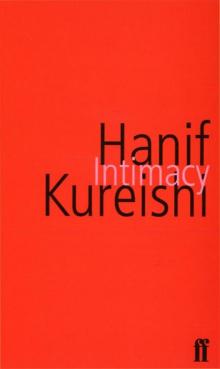 Intimacy
Intimacy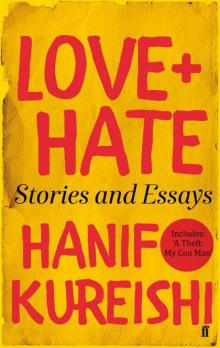 Love + Hate: Stories and Essays
Love + Hate: Stories and Essays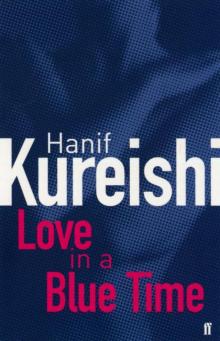 Love in a Blue Time
Love in a Blue Time Something to Tell You
Something to Tell You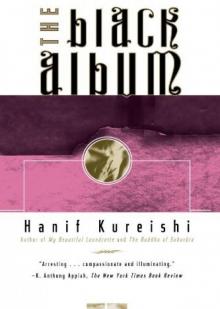 The Black Album
The Black Album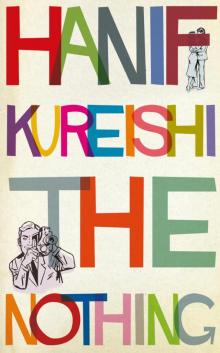 The Nothing
The Nothing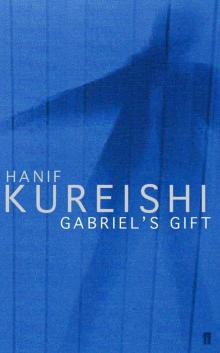 Gabriel's Gift
Gabriel's Gift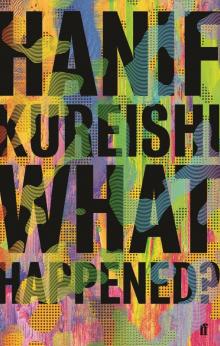 What Happened?
What Happened? Midnight All Day
Midnight All Day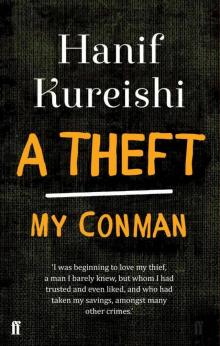 A Theft: My Con Man
A Theft: My Con Man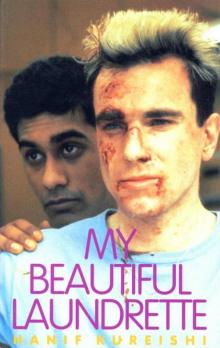 My Beautiful Launderette
My Beautiful Launderette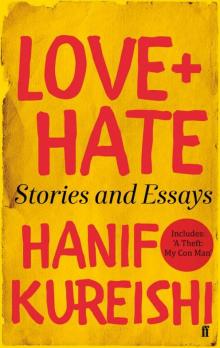 Love + Hate
Love + Hate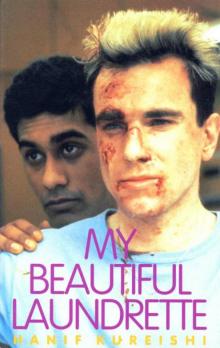 My Beautiful Laundrette
My Beautiful Laundrette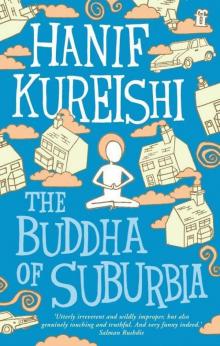 The Buddha of Suburbia
The Buddha of Suburbia